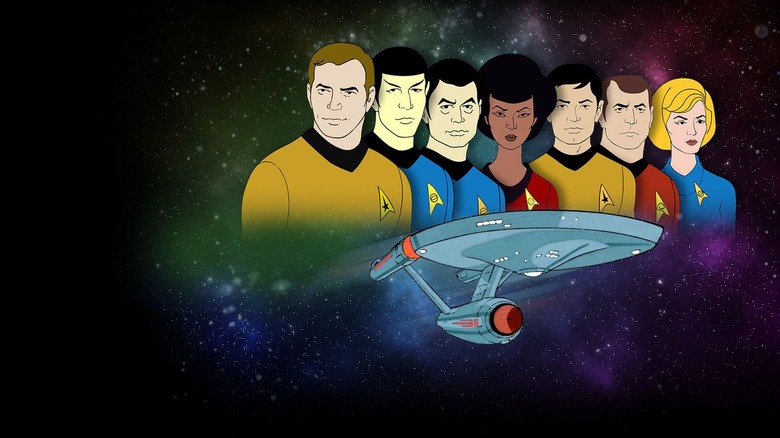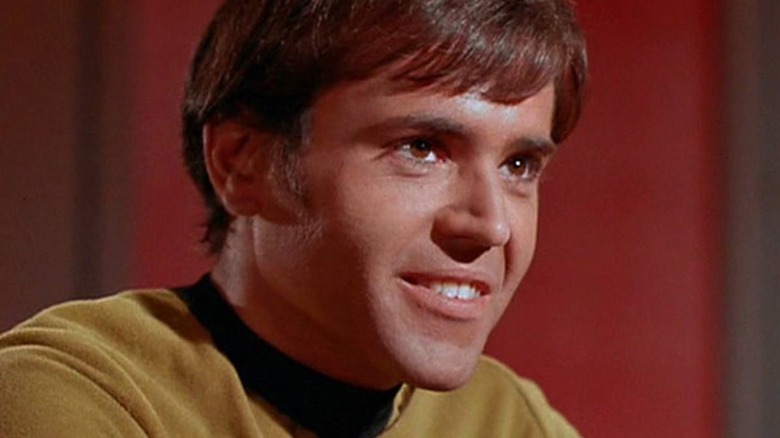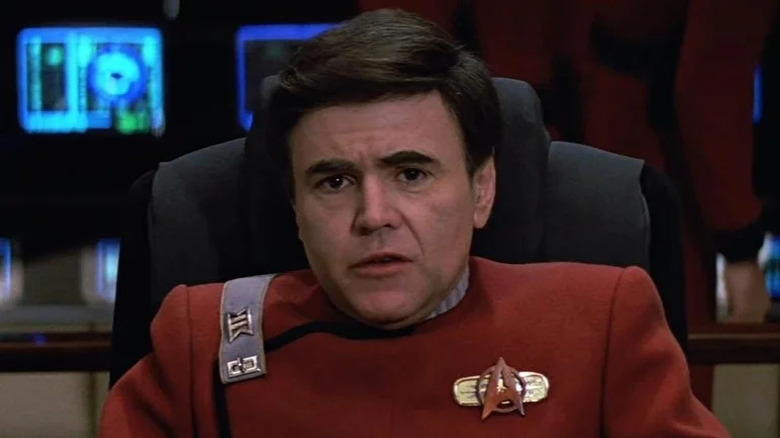Star Trek: The Animated Series Had To Jettison Chekov From The Crew For One Major Reason
"Star Trek: The Motion Picture" was the onscreen reunion of the Enterprise crew, premiering in 1979, a decade after "Star Trek" was canceled. What more casual Trekkies may not know is that (most of) the cast had already come together again in that interim (and I don't mean just for "Trek" conventions).
That reunion would be "Star Trek: The Animated Series," which aired for 22 episodes from 1973 to 1974. The series was made in the style of the original, but there were a few changes in the medium shift. Stories were told in a breezy 20+ minutes, not the hour-long packaging the live-action show had used. Since animation doesn't have to worry about makeup expenses, "The Animated Series" featured much more (and much weirder) aliens than "Star Trek" had.
The animation was done by Filmation, nowadays mostly remembered for their stiff animation on programs like "He-Man and the Masters of the Universe." The cast of "The Original Series" voiced their animated avatars, drawn in their likeness ... except for Walter Koenig, for Mr. Chekov was nowhere to be seen. As it turns out, the animation wasn't the only cost-cutting going on with "Star Trek: The Animated Series."
Cost-cutting on Star Trek: The Animated Series
Initially, the cuts to the cast for "The Animated Series" would have been steeper: George Takei (Mr. Sulu) and Nichelle Nichols (Lt. Uhura) would have been excluded as well. Leonard Nimoy (Spock) took a stand, refusing to do the show without them. Thus, they were hired back. After Nimoy's passing in 2015, Takei fondly recalled the actor going to bat for him to Entertainment Weekly:
"[Leonard] asked, 'Why aren't Nichelle and George on board as well?' They said, 'We don't have the budget for them.' And Leonard said, ”Star Trek' is about diversity, and the two people who represent diversity most are Nichelle and George, and if they can't be a part of this project, then you don't want me.' He was willing to walk off that show for us. That takes guts and principles and loyalty. It was because of that strong position that he took that Nichelle and I were hired to do the voices on the animated series as well."
Unfortunately, the budget evidently couldn't accommodate Koenig; Chekov was the most dispensable member of the original cast (he'd only joined the show in season 2). As for Majel Barrett coming back as Nurse Chapel in "The Animated Series"? It helps to be married to the boss (i.e. "Star Trek" creator Gene Roddenberry).
Koenig told StarTrek.com in 2011 that he was "very disappointed" about not being included. He admired Nimoy taking a stand for Takei and Nichols, and understood he has less cache than the original cast members, but felt "kind of screwed around" all the same. "The final insult" was how he found out he was being excluded; a fan asked him about it at a convention, catching him flat-footed.
Walter Koenig writes on Star Trek
Koenig is one of many actors to have departed the "Star Trek" franchise (though he came back for the aforementioned movies). However, as a consolation prize, he was hired to write an episode for "The Animated Series" — "The Infinite Vulcan." In the episode, the Enterprise encounters a race of plant-like aliens who clone Spock.
In the aforementioned 2011 interview, Koenig recounted writing the episode. He got the idea from "the newspapers" ("Cloning was something that was being speculated about a great deal in [the 1970s]"). He describes the writing experience as an "unpleasant" one; he remembers penning ten drafts and was pushed by Roddenberry to make the script more outlandish, thus befitting animation.
While disappointed at not being involved more in "The Animated Series," Koenig felt the series was only "OK."
"Obviously, the writing was better than the animation, and that put it in a very untenable place because the people [adults] who could appreciate the storylines had to sit through some primitive animation and those [children] who were happy with the animation were not likely to absorb the storylines as well as their grown-up counterparts."
Considering "Star Trek" only found renewed success when it went back to live-action (on the films and "The Next Generation"), Koenig does have a point.


